
Unveiling the Frontiers of Artificial Intelligence at Tel Aviv University AI Day 2024
Written on | Tel Aviv University
From Cybersecurity to Democracy: Challenges and Innovations in AI Research and Applications.
On February 5, Tel Aviv University brought together key figures in the field of Artificial Intelligence (AI) for the highly anticipated AI Day 2024. This gathering served as a forum for researchers, industry professionals, and experts to delve into crucial issues in AI research and applications, providing insights into the foundational theories driving this rapidly evolving field. The event specifically highlighted AI’s significance in times of war, featuring discussions on computer vision, NLP, regulation, and the complexities of tackling fake news.
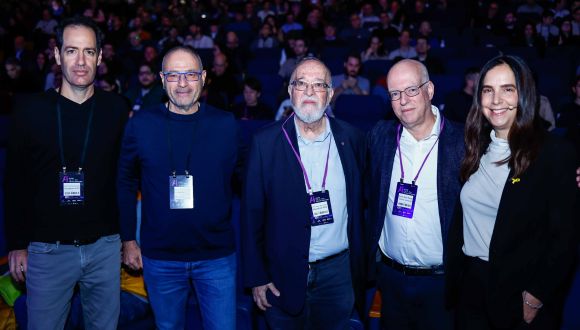 Yorai Fainmesser (Co-Founder, General Partner at Disruptive AI VC), Professor Meir Feder (Tel Aviv University), Major General Isaac Ben Israel (Director of TAU Blavatnik ICRC), Professor Ariel Porat (President of Tel Aviv University), Gili Drob-Heistein (Executive Director of the Blavatnik ICRC). Photo courtesy of Blavatnik ICRC
Opening the AI Day 2024, Professor Ariel Porat, President of Tel Aviv University, emphasized that the AI Day embodies the resilient spirit of Tel Aviv University and the country – as Israel does not have the privilege to suspend all activities for a year, nor can the university stop training students and producing research.
While a full AI week will take place later in the year, alongside the Cyber Week scheduled for June, a one-day event is a testament to the strength of Israel as a nation in these trying times.
Yorai Fainmesser (Co-Founder, General Partner at Disruptive AI VC), Professor Meir Feder (Tel Aviv University), Major General Isaac Ben Israel (Director of TAU Blavatnik ICRC), Professor Ariel Porat (President of Tel Aviv University), Gili Drob-Heistein (Executive Director of the Blavatnik ICRC). Photo courtesy of Blavatnik ICRC
Opening the AI Day 2024, Professor Ariel Porat, President of Tel Aviv University, emphasized that the AI Day embodies the resilient spirit of Tel Aviv University and the country – as Israel does not have the privilege to suspend all activities for a year, nor can the university stop training students and producing research.
While a full AI week will take place later in the year, alongside the Cyber Week scheduled for June, a one-day event is a testament to the strength of Israel as a nation in these trying times.
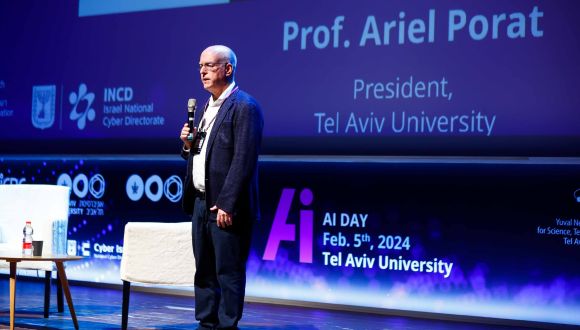 Professor Ariel Porat, President of Tel Aviv University (Photo courtesy of Blavatnik ICRC)
Prof Porat underscored TAU’s commitment to developing AI and data science expertise through its recently established multidisciplinary center that offers a cluster of AI and data science courses to TAU students from all faculties.
Professor Ariel Porat, President of Tel Aviv University (Photo courtesy of Blavatnik ICRC)
Prof Porat underscored TAU’s commitment to developing AI and data science expertise through its recently established multidisciplinary center that offers a cluster of AI and data science courses to TAU students from all faculties.
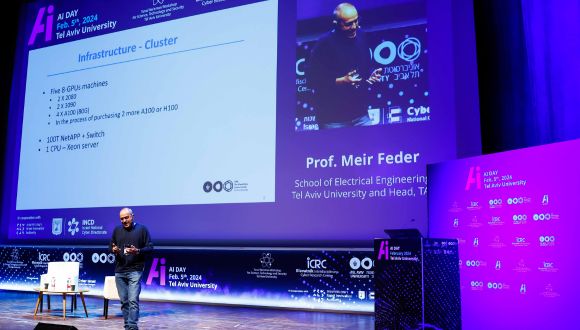 Professor Meir Feder, Tel Aviv University (Photo courtesy of Blavatnik ICRC)
Prof. Feder remarked that, presently, AI falls short of true intelligence, characterizing it as a clever ‘cut and paste’ solution devoid of genuine creativity.
Professor Meir Feder, Tel Aviv University (Photo courtesy of Blavatnik ICRC)
Prof. Feder remarked that, presently, AI falls short of true intelligence, characterizing it as a clever ‘cut and paste’ solution devoid of genuine creativity.
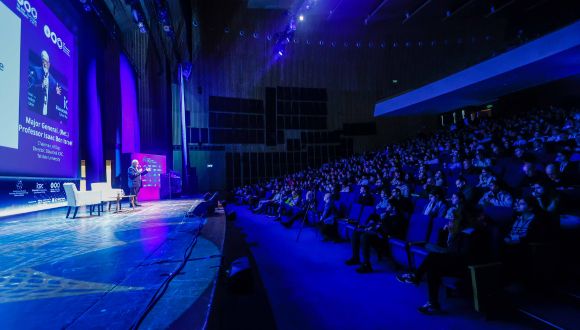 Major General Isaac Ben Israel, Director of TAU Blavatnik ICRC (Photo courtesy of Blavatnik ICRC)
Given the critical significance of cybersecurity in light of the rapid proliferation of AI, a dedicated conference track was exclusively focused on security issues. The track centered on exploring the utilization of AI in intelligence gathering and analysis, threat detection, alert investigation, security posture analysis, and other pertinent areas to boost the effectiveness of security teams in their daily operations.
Major General Isaac Ben Israel, Director of TAU Blavatnik ICRC (Photo courtesy of Blavatnik ICRC)
Given the critical significance of cybersecurity in light of the rapid proliferation of AI, a dedicated conference track was exclusively focused on security issues. The track centered on exploring the utilization of AI in intelligence gathering and analysis, threat detection, alert investigation, security posture analysis, and other pertinent areas to boost the effectiveness of security teams in their daily operations.
 (Photo courtesy of Blavatnik ICRC)
The solution can adjust the length and tone of the comments, as well as the level of formality and political and ideological stance to suit the target language and culture. It is also capable of understanding context and captions.
Using AI on social media provides for faster and more impactful responses across multiple platforms. The AI agent can also predict how popular the content will be and estimate confidence in the response. In addition, it can report hateful posts found online.
(Photo courtesy of Blavatnik ICRC)
The solution can adjust the length and tone of the comments, as well as the level of formality and political and ideological stance to suit the target language and culture. It is also capable of understanding context and captions.
Using AI on social media provides for faster and more impactful responses across multiple platforms. The AI agent can also predict how popular the content will be and estimate confidence in the response. In addition, it can report hateful posts found online.
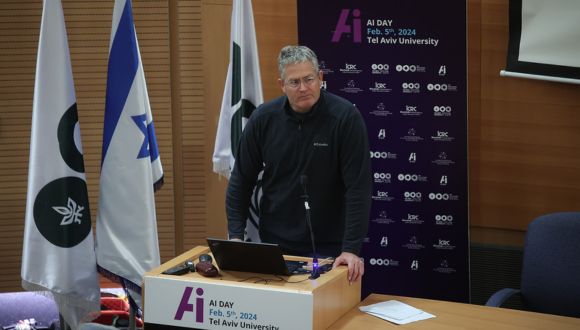 Prof. Ben Gal (Photo courtesy of Blavatnik ICRC)
Prof. Ben Gal illustrated this approach with the example of the Gaza hospital attack, where an immediate surge in coordinated activity by a significant number of bots was observed.
Prof. Ben Gal (Photo courtesy of Blavatnik ICRC)
Prof. Ben Gal illustrated this approach with the example of the Gaza hospital attack, where an immediate surge in coordinated activity by a significant number of bots was observed.
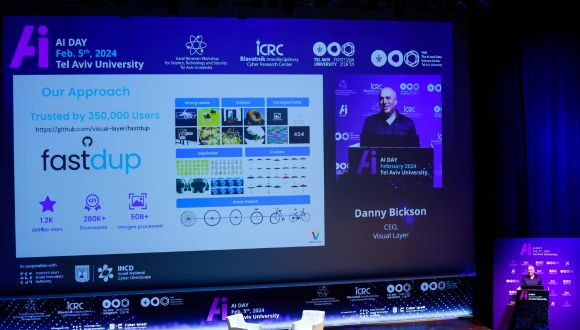 Danny Bickson, CEO of Visual Layer (Photo courtesy of Blavatnik ICRC)
Computer vision experts have also been working with war footage, managing, exploring and visualizing war crime videos. Danny Bickson, CEO of Visual Layer, a startup creating & maintaining the popular open source fastdup for managing large-scale visual data, detailed the pro bono work the company has been doing for the Ministry of Diaspora and Ministry of Defense.
Danny Bickson, CEO of Visual Layer (Photo courtesy of Blavatnik ICRC)
Computer vision experts have also been working with war footage, managing, exploring and visualizing war crime videos. Danny Bickson, CEO of Visual Layer, a startup creating & maintaining the popular open source fastdup for managing large-scale visual data, detailed the pro bono work the company has been doing for the Ministry of Diaspora and Ministry of Defense.
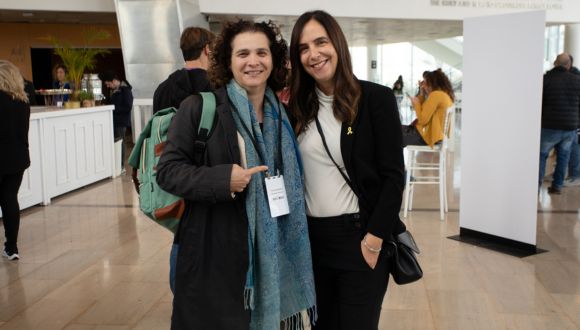 Professor Karine Nahon, Reichman University, and Gili Drob-Heistein, Executive Director of the Blavatnik ICRC and Yuval Ne’eman Workshop for Science, Technology and Security (Photo courtesy of Blavatnik ICRC)
The volunteer initiative spearheaded by Nahon brought together 1500 people from academia and industry. They collaborated to pool data from diverse online sources, including Hamas’s telegram channels, content uploaded by individuals on the ground, and footage from Hamas terrorists. The goal of the team was to devise effective strategies for identifying hostages and kidnappers.
Professor Karine Nahon, Reichman University, and Gili Drob-Heistein, Executive Director of the Blavatnik ICRC and Yuval Ne’eman Workshop for Science, Technology and Security (Photo courtesy of Blavatnik ICRC)
The volunteer initiative spearheaded by Nahon brought together 1500 people from academia and industry. They collaborated to pool data from diverse online sources, including Hamas’s telegram channels, content uploaded by individuals on the ground, and footage from Hamas terrorists. The goal of the team was to devise effective strategies for identifying hostages and kidnappers.
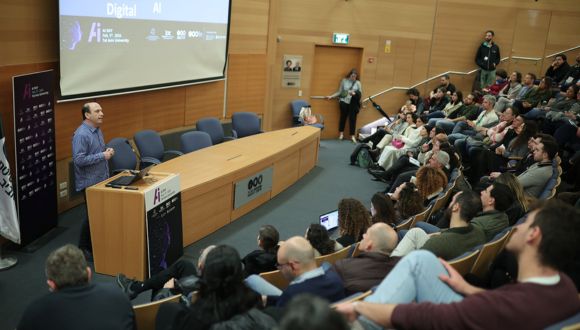 Professor Noam Shomron, TAU ( (Photo courtesy of Blavatnik ICRC)
Professor Erez Shmueli, Head of the Big Data Lab and Co-Head of the Data Science undergraduate program at Tel Aviv University, presented findings from a study monitoring early signs of PTSD in individuals indirectly exposed to the October 7 events. The results reveal unprecedented levels of stress and PTSD among participants.
Professor Noam Shomron, TAU ( (Photo courtesy of Blavatnik ICRC)
Professor Erez Shmueli, Head of the Big Data Lab and Co-Head of the Data Science undergraduate program at Tel Aviv University, presented findings from a study monitoring early signs of PTSD in individuals indirectly exposed to the October 7 events. The results reveal unprecedented levels of stress and PTSD among participants.
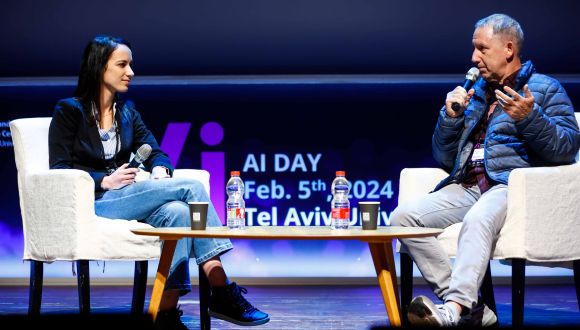 Mor Geva, Assistant Professor at the Blavatnik School of Computer Science, Tel Aviv University and Professor Yoav Shoham, Co-founder and Co-CEO at AI21 Labs (Photo courtesy of Blavatnik ICRC)
Shoham emphasized that the relationship with machines will be transformative for humanity rather than destructive. He envisions a future where machines and humans coexist and collaborate.
Mor Geva, Assistant Professor at the Blavatnik School of Computer Science, Tel Aviv University and Professor Yoav Shoham, Co-founder and Co-CEO at AI21 Labs (Photo courtesy of Blavatnik ICRC)
Shoham emphasized that the relationship with machines will be transformative for humanity rather than destructive. He envisions a future where machines and humans coexist and collaborate.
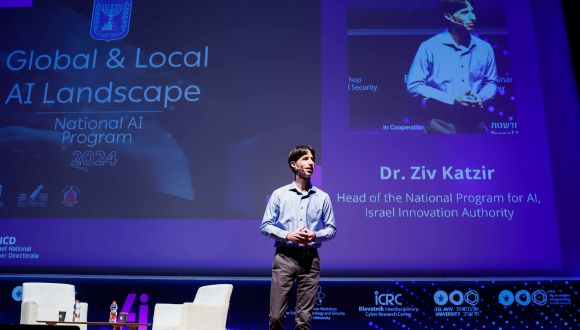 Dr. Ziv Katzir, head of the National AI program (Photo courtesy of Blavatnik ICRC)
Locally, the National AI program shifted focus to practical solutions, emphasizing natural language processing for Hebrew and spoken Arabic, AI talent development through scholarships at all levels of higher education, investment in computer infrastructure, wider AI application in the public sector, and the development of a legal framework for trustworthy AI.
Dr. Ziv Katzir, head of the National AI program (Photo courtesy of Blavatnik ICRC)
Locally, the National AI program shifted focus to practical solutions, emphasizing natural language processing for Hebrew and spoken Arabic, AI talent development through scholarships at all levels of higher education, investment in computer infrastructure, wider AI application in the public sector, and the development of a legal framework for trustworthy AI.
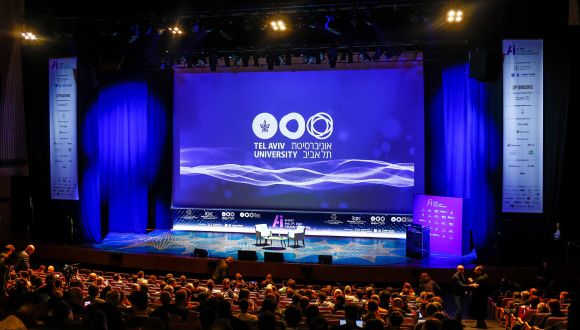 (Photo courtesy of Blavatnik ICRC)
AI Day 2024, held at Tel Aviv University in cooperation with the Israel Innovation Authority and Israel National Cyber Directorate, captured the collaborative spirit of experts and industry leaders, emphasizing AI’s role in driving positive change. Beyond a gathering, AI Day 2024 embodied a commitment to a future where AI propels innovation and progress in tangible ways.
(Photo courtesy of Blavatnik ICRC)
AI Day 2024, held at Tel Aviv University in cooperation with the Israel Innovation Authority and Israel National Cyber Directorate, captured the collaborative spirit of experts and industry leaders, emphasizing AI’s role in driving positive change. Beyond a gathering, AI Day 2024 embodied a commitment to a future where AI propels innovation and progress in tangible ways.
 Yorai Fainmesser (Co-Founder, General Partner at Disruptive AI VC), Professor Meir Feder (Tel Aviv University), Major General Isaac Ben Israel (Director of TAU Blavatnik ICRC), Professor Ariel Porat (President of Tel Aviv University), Gili Drob-Heistein (Executive Director of the Blavatnik ICRC). Photo courtesy of Blavatnik ICRC
Opening the AI Day 2024, Professor Ariel Porat, President of Tel Aviv University, emphasized that the AI Day embodies the resilient spirit of Tel Aviv University and the country – as Israel does not have the privilege to suspend all activities for a year, nor can the university stop training students and producing research.
While a full AI week will take place later in the year, alongside the Cyber Week scheduled for June, a one-day event is a testament to the strength of Israel as a nation in these trying times.
Yorai Fainmesser (Co-Founder, General Partner at Disruptive AI VC), Professor Meir Feder (Tel Aviv University), Major General Isaac Ben Israel (Director of TAU Blavatnik ICRC), Professor Ariel Porat (President of Tel Aviv University), Gili Drob-Heistein (Executive Director of the Blavatnik ICRC). Photo courtesy of Blavatnik ICRC
Opening the AI Day 2024, Professor Ariel Porat, President of Tel Aviv University, emphasized that the AI Day embodies the resilient spirit of Tel Aviv University and the country – as Israel does not have the privilege to suspend all activities for a year, nor can the university stop training students and producing research.
While a full AI week will take place later in the year, alongside the Cyber Week scheduled for June, a one-day event is a testament to the strength of Israel as a nation in these trying times.
 Professor Ariel Porat, President of Tel Aviv University (Photo courtesy of Blavatnik ICRC)
Prof Porat underscored TAU’s commitment to developing AI and data science expertise through its recently established multidisciplinary center that offers a cluster of AI and data science courses to TAU students from all faculties.
Professor Ariel Porat, President of Tel Aviv University (Photo courtesy of Blavatnik ICRC)
Prof Porat underscored TAU’s commitment to developing AI and data science expertise through its recently established multidisciplinary center that offers a cluster of AI and data science courses to TAU students from all faculties.
“Ideally all students should have the opportunity to study AI as it is an engine for the development of all research fields. And in each and every field there are different challenges to be overcome”—Professor Ariel Porat, President of Tel Aviv UniversityIn 2023, Tel Aviv University enrolled its first cohort of graduate students in a newly launched master’s program in AI, further cementing TAU’s position as the largest AI center in Israel that fosters interdisciplinary collaborations in the field.
Perspectives on Challenges and Security Concerns
TAU Professor Meir Feder, head of the TAU Center for Artificial Intelligence & Data Science (TAD), offered his view of pressing issues in the field of AI. He addressed the exorbitant costs associated with AI, prompting questions about ownership rights and control. Professor Meir Feder, Tel Aviv University (Photo courtesy of Blavatnik ICRC)
Prof. Feder remarked that, presently, AI falls short of true intelligence, characterizing it as a clever ‘cut and paste’ solution devoid of genuine creativity.
Professor Meir Feder, Tel Aviv University (Photo courtesy of Blavatnik ICRC)
Prof. Feder remarked that, presently, AI falls short of true intelligence, characterizing it as a clever ‘cut and paste’ solution devoid of genuine creativity.
“We know what we built but we do not know why it works,”—Prof. Meir FederMajor General (Ret.) Isaac Ben Israel, Chairman of the AI Day and the Director of TAU Blavatnik ICRC, highlighted several challenges associated with the rapid development of AI, emphasizing the escalating vulnerability of various spheres of human activity to cyber attacks. This vulnerability becomes ever more pronounced as our dependence on AI grows.
 Major General Isaac Ben Israel, Director of TAU Blavatnik ICRC (Photo courtesy of Blavatnik ICRC)
Given the critical significance of cybersecurity in light of the rapid proliferation of AI, a dedicated conference track was exclusively focused on security issues. The track centered on exploring the utilization of AI in intelligence gathering and analysis, threat detection, alert investigation, security posture analysis, and other pertinent areas to boost the effectiveness of security teams in their daily operations.
Major General Isaac Ben Israel, Director of TAU Blavatnik ICRC (Photo courtesy of Blavatnik ICRC)
Given the critical significance of cybersecurity in light of the rapid proliferation of AI, a dedicated conference track was exclusively focused on security issues. The track centered on exploring the utilization of AI in intelligence gathering and analysis, threat detection, alert investigation, security posture analysis, and other pertinent areas to boost the effectiveness of security teams in their daily operations.
AI at the Service of Democracy and Truth
In the Fake News track, several of the talks focused on the AI tools that can efficiently detect fake images and stories online, identify social media bots and trolls used for commercial and political influence, and uncover deep fakes, which have inundated the social media recently in massive disinformation or influence campaigns.“The Russia-Ukraine war was the first war fought on social media,”—Tom Alexandrovitch, Executive Director of the Defense Division, Israel National Cyber Directorate (INCD)Zachary Elisha Bamberger, from the Technion, presented the AI-powered persuasive argumentation agent developed to combat hate and misinformation online in the wake of October 7. The underlying principles of the agent that posts comments under anti-Israeli content on social media include establishing trust by citing sources and figures of authority, effectively using logic and complex reasoning, and leveraging emotional appeal.
 (Photo courtesy of Blavatnik ICRC)
The solution can adjust the length and tone of the comments, as well as the level of formality and political and ideological stance to suit the target language and culture. It is also capable of understanding context and captions.
Using AI on social media provides for faster and more impactful responses across multiple platforms. The AI agent can also predict how popular the content will be and estimate confidence in the response. In addition, it can report hateful posts found online.
(Photo courtesy of Blavatnik ICRC)
The solution can adjust the length and tone of the comments, as well as the level of formality and political and ideological stance to suit the target language and culture. It is also capable of understanding context and captions.
Using AI on social media provides for faster and more impactful responses across multiple platforms. The AI agent can also predict how popular the content will be and estimate confidence in the response. In addition, it can report hateful posts found online.
By 2026, 90% of media online will be AI-generated —EuropolProfessor Irad Ben Gal, Head of TAU LAMBDA lab, discussed the strategy of unveiling inauthentic synchronized campaigns on social media. Emphasizing the importance of combating the infrastructure rather than individually pursuing posts, he highlighted the value of analyzing bot activity. This approach makes it possible to detect coordination of fake users, model their behavior, and make recommendations for exposing and mitigating their impact.
 Prof. Ben Gal (Photo courtesy of Blavatnik ICRC)
Prof. Ben Gal illustrated this approach with the example of the Gaza hospital attack, where an immediate surge in coordinated activity by a significant number of bots was observed.
Prof. Ben Gal (Photo courtesy of Blavatnik ICRC)
Prof. Ben Gal illustrated this approach with the example of the Gaza hospital attack, where an immediate surge in coordinated activity by a significant number of bots was observed.
$78 bln lost each year due to narrative attacks +400% antisemitic incidents in the USA 88% of investors consider narrative attacks on corporations a serious issueMichael Matias, CEO of Clarity, stressed that the staggering growth in the number of deepfakes online and AI disinformation in general poses the foremost threat to democracy on a global scale. Therefore, the critical task of detecting deepfakes is of paramount importance at the moment.
“There has been a 900% yearly increase in the number of deepfakes online,”—Michael Matias, CEO of ClarityIn the arms race of generative AI vs detector AI, another major task is protecting the integrity of history, so Clarity has been actively involved in the authentication of media from October 7 massacre.
 Danny Bickson, CEO of Visual Layer (Photo courtesy of Blavatnik ICRC)
Computer vision experts have also been working with war footage, managing, exploring and visualizing war crime videos. Danny Bickson, CEO of Visual Layer, a startup creating & maintaining the popular open source fastdup for managing large-scale visual data, detailed the pro bono work the company has been doing for the Ministry of Diaspora and Ministry of Defense.
Danny Bickson, CEO of Visual Layer (Photo courtesy of Blavatnik ICRC)
Computer vision experts have also been working with war footage, managing, exploring and visualizing war crime videos. Danny Bickson, CEO of Visual Layer, a startup creating & maintaining the popular open source fastdup for managing large-scale visual data, detailed the pro bono work the company has been doing for the Ministry of Diaspora and Ministry of Defense.
“The Iron Swords War is one of the first wars where critical visual information is found on millions of social network videos released daily.”— Danny Bickson, CEO of Visual LayerProfessor Karine Nahon, Head of Data, Government and Democracy program at Reichman University, emphasized in her talk about the work of the missing and hostages war room that technology alone is not sufficient. It is ultimately down to the people to not only develop new algorithms, but also to create an environment conducive to nurturing ideas.
 Professor Karine Nahon, Reichman University, and Gili Drob-Heistein, Executive Director of the Blavatnik ICRC and Yuval Ne’eman Workshop for Science, Technology and Security (Photo courtesy of Blavatnik ICRC)
The volunteer initiative spearheaded by Nahon brought together 1500 people from academia and industry. They collaborated to pool data from diverse online sources, including Hamas’s telegram channels, content uploaded by individuals on the ground, and footage from Hamas terrorists. The goal of the team was to devise effective strategies for identifying hostages and kidnappers.
Professor Karine Nahon, Reichman University, and Gili Drob-Heistein, Executive Director of the Blavatnik ICRC and Yuval Ne’eman Workshop for Science, Technology and Security (Photo courtesy of Blavatnik ICRC)
The volunteer initiative spearheaded by Nahon brought together 1500 people from academia and industry. They collaborated to pool data from diverse online sources, including Hamas’s telegram channels, content uploaded by individuals on the ground, and footage from Hamas terrorists. The goal of the team was to devise effective strategies for identifying hostages and kidnappers.
“You can’t use the usual face recognition AI when the face is bleeding. There is also a lot of human intelligence and social network analysis,”— Professor Karine Nahon, Reichman UniversityThis concentrated effort has yielded at least six algorithms that can be helpful in the event of future multi-casualty incidents.
Becoming Stronger with AI
AI has the potential to enhance resilience across various sectors, spanning public services, education, health, defense, economics, emergency response, transportation, science, and climate. In the field of education, AI can assist teachers in crafting personalized learning content tailored to individual student needs. However, it is imperative to consider crucial issues such as responsible AI usage, privacy protection, and ensuring equitable access to these technologies.“Our goal is to understand how education can use AI in a smart and fair way, helping to create a strong and adaptable learning environment,”— Merav Mofaz, Microsoft EducationIn the realm of medicine, AI plays a pivotal role, especially in diagnostics and DNA testing. It proves invaluable in forensic DNA analysis for identification purposes. Professor Noam Shomron, Head of the Functional Genomic Team at the TAU Faculty of Medicine, detailed the work undertaken post-October 7 to identify victims of the massacre using very small or damaged DNA fragments recovered from severely burnt bodies. Additionally, AI can aid in identifying soldiers potentially prone to PTSD, enabling preventive treatment.
 Professor Noam Shomron, TAU ( (Photo courtesy of Blavatnik ICRC)
Professor Erez Shmueli, Head of the Big Data Lab and Co-Head of the Data Science undergraduate program at Tel Aviv University, presented findings from a study monitoring early signs of PTSD in individuals indirectly exposed to the October 7 events. The results reveal unprecedented levels of stress and PTSD among participants.
Professor Noam Shomron, TAU ( (Photo courtesy of Blavatnik ICRC)
Professor Erez Shmueli, Head of the Big Data Lab and Co-Head of the Data Science undergraduate program at Tel Aviv University, presented findings from a study monitoring early signs of PTSD in individuals indirectly exposed to the October 7 events. The results reveal unprecedented levels of stress and PTSD among participants.
“News consumption and the number of gory videos watched significantly correlate with PTSD prevalence,”—Professor Erez Shmueli, Tel Aviv UniversityContinuous monitoring through smartwatches and daily questionnaires highlighted significant variations in stress, mood, step counts, sleep quality, and duration in the first week post-October 7 events, particularly among those who later developed PTSD.
What the Future Holds
In the fireside chat discussion, Professor Yoav Shoham, Co-founder and Co-CEO at AI21 Labs, shared insights on AI and natural language processing in 2024. He anticipates the continued emergence of new language models, with smaller specialized models potentially remaining open source, while larger models are likely to remain proprietary. Language models will be incorporated in larger, more comprehensive AI tools. Mor Geva, Assistant Professor at the Blavatnik School of Computer Science, Tel Aviv University and Professor Yoav Shoham, Co-founder and Co-CEO at AI21 Labs (Photo courtesy of Blavatnik ICRC)
Shoham emphasized that the relationship with machines will be transformative for humanity rather than destructive. He envisions a future where machines and humans coexist and collaborate.
Mor Geva, Assistant Professor at the Blavatnik School of Computer Science, Tel Aviv University and Professor Yoav Shoham, Co-founder and Co-CEO at AI21 Labs (Photo courtesy of Blavatnik ICRC)
Shoham emphasized that the relationship with machines will be transformative for humanity rather than destructive. He envisions a future where machines and humans coexist and collaborate.
“We’ll control the potential downside. I’m more concerned that AI won’t be powerful enough than that it will be too powerful,”—Professor Yoav ShohamProf. Lior Wolf, in the Computer Vision track, noted that major AI tasks have been solved, leading to the next challenge of building and training general-purpose robots. Dr. Ziv Katzir, head of the national AI program, highlighted global trends toward legal regulation of AI, including a proposed global treaty. Despite an overall decline in funding, there’s exponential growth in generative AI investment.
 Dr. Ziv Katzir, head of the National AI program (Photo courtesy of Blavatnik ICRC)
Locally, the National AI program shifted focus to practical solutions, emphasizing natural language processing for Hebrew and spoken Arabic, AI talent development through scholarships at all levels of higher education, investment in computer infrastructure, wider AI application in the public sector, and the development of a legal framework for trustworthy AI.
Dr. Ziv Katzir, head of the National AI program (Photo courtesy of Blavatnik ICRC)
Locally, the National AI program shifted focus to practical solutions, emphasizing natural language processing for Hebrew and spoken Arabic, AI talent development through scholarships at all levels of higher education, investment in computer infrastructure, wider AI application in the public sector, and the development of a legal framework for trustworthy AI.
Israel consistently ranks in the top ten overall and is second in terms of per capita investment in AISince the outbreak of the Israel-Hamas war, the Israeli Investment Authority has launched a new fast-track fund to fund local high-tech companies in the product development phase to strengthen the sector and national economy as a whole.
 (Photo courtesy of Blavatnik ICRC)
AI Day 2024, held at Tel Aviv University in cooperation with the Israel Innovation Authority and Israel National Cyber Directorate, captured the collaborative spirit of experts and industry leaders, emphasizing AI’s role in driving positive change. Beyond a gathering, AI Day 2024 embodied a commitment to a future where AI propels innovation and progress in tangible ways.
(Photo courtesy of Blavatnik ICRC)
AI Day 2024, held at Tel Aviv University in cooperation with the Israel Innovation Authority and Israel National Cyber Directorate, captured the collaborative spirit of experts and industry leaders, emphasizing AI’s role in driving positive change. Beyond a gathering, AI Day 2024 embodied a commitment to a future where AI propels innovation and progress in tangible ways.
